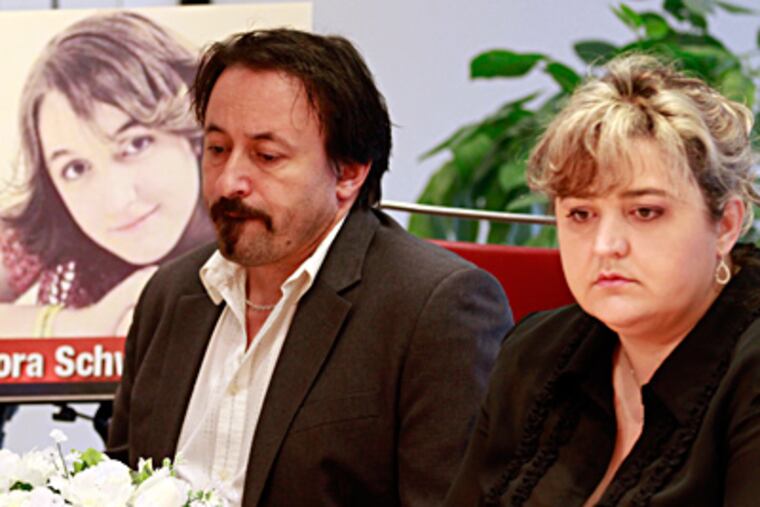Duck boat victims' families joined at trial
In the nearly two years since their children drowned in the Delaware, the families of Dora Schwendtner and Szabolcs Prem have grown close.

In the nearly two years since their children drowned in the Delaware, the families of Dora Schwendtner and Szabolcs Prem have grown close.
They had never met before the summer of 2010, when Dora, 16, and Szabolcs, 20, came to Philadelphia as part of a church-sponsored cross-cultural trip. But on July 7 of that year, after a barge overran the Ride the Ducks tour boat that had been anchored with engine trouble in the middle of a shipping lane, the families were thrown together by tragedy.
Some of them arrived in Philadelphia over the weekend to prepare for the nonjury civil trial regarding the accident scheduled to begin Monday.
"We don't have lives anymore," said Sandor Prem, a 50-year-old mason from a small Hungarian farming community about an hour from the Austrian border. He and his wife, Mari, now spend holidays with Peter and Aniko Schwendtner, Dora's parents, and her stepfather, Gabor Csirke.
"We have no family anymore," Prem said, explaining that his son and Dora were only children. "So we have become family to one another."
It is their second trip to the city. On their last visit, a month after the accident, they held a small ceremony near the site where their children's bodies were discovered.
During an interview Sunday in the lobby of the Center City hotel where they are staying, the families spoke through one of their lawyers, Peter Ronai, who translated from Hungarian.
As time goes on, they said, they feel trapped in a horrible limbo.
"Unlike the survivors, we don't know what happened to our children," Peter Schwendter said. "I have nightmares, seeing my daughter drown slowly, painfully. It's like a torture chamber inside my head."
Both families have left their children's bedrooms untouched as memorials.
Friends of Szabolcs, who was an avid soccer player and fan, brought his parents a life-size photograph of him. His mother put it up on the wall behind his bed, where he used to hang a banner of his favorite team, FC Bayern Munich, the most successful German soccer club.
"I go into his room every day and touch the photo lovingly," she said, weeping. "If I go in there 100 times, I touch it 100 times." She took down the soccer banner and laid it beside her son's grave, she said.
At trial, the families' lawyers, Robert Mongeluzzi, Ronai, and Ronai's wife, Holly, will argue that the companies that owned and operated the three vessels involved in the accident - the Ride the Ducks boat, the barge, and the tugboat pushing the barge - were negligent in numerous ways.
The Schwendtners, Csirke, and the Prems will all be in the courtroom for opening arguments on Monday before U.S. District Judge Thomas N. O'Neill and will stay for the first week of the trial, which is expected to last more than a month.
The substance of the case has to do with limited-liability rules in maritime cases.
The families' attorneys say K-Sea Transportation Partners, owner-operator of the tugboat that was pushing the barge, along with the Georgia company that operates Ride the Ducks, contends that according to an 1851 federal law, its maximum liability should be the value of the vessels involved in the accident.
The companies have reportedly set the tug's value at $1.65 million and the Ride the Ducks vehicle at $150,000 (based on the value of the salvaged ducks craft). Mongeluzzi said he and his colleagues would argue that the accident resulted from inadequate employee training and repeated failures to enforce safety policies and procedures both on the tugboat and the Ride the Ducks vessel.
Spokesmen for Ride the Ducks and K-Sea said they could not comment on pending litigation.
In November, Matthew Devlin, first mate on the tug, was sentenced to a year in prison after pleading guilty to involuntary manslaughter. Devlin, 35, had been distracted on his cellphone and laptop, concerned about his own child's health after a mishap while under anesthesia.
"He isn't the only one to blame," Peter Schwendtner said. "The drivers of the duck boat were just as guilty as Matt, if not more. And the corporations. The people on the boats, they make human errors, but the corporations' policies and procedures allowed this accident to exist. . . . What good is a rule if it's not enforced?"
"The corporations should hire experienced people who know what they're doing," Sandor Prem added. "Not people who are only fit to drive a horse carriage." He wrung his thick hands and placed them on the knees of his worn jeans. "But all the changes don't bring back our children. Why do the changes always have to come after someone dies?"
For the mothers, Sunday was particularly difficult, they said, because it was the Hungarian Mother's Day.
On most occasions like that, Sandor Prem takes his wife away from home to try to keep her mind off the loss of their son. And on Christmas, the families have started a tradition, going to a castle where they celebrate, and mourn, in one another's company.
"But it doesn't matter where we go," Mari Prem said. "Honestly, our attention cannot be brought away."
Should their lawyers prevail in the case, they will likely receive substantial sums of money.
"I don't like to talk about that," Sandor Prem said. "This is not about money. It's about punishment."
Aniko Schwendtner, holding back sobs, wiped her eyes with a tissue. "And, anyway, how much are you going to pay for the loss of your child?"